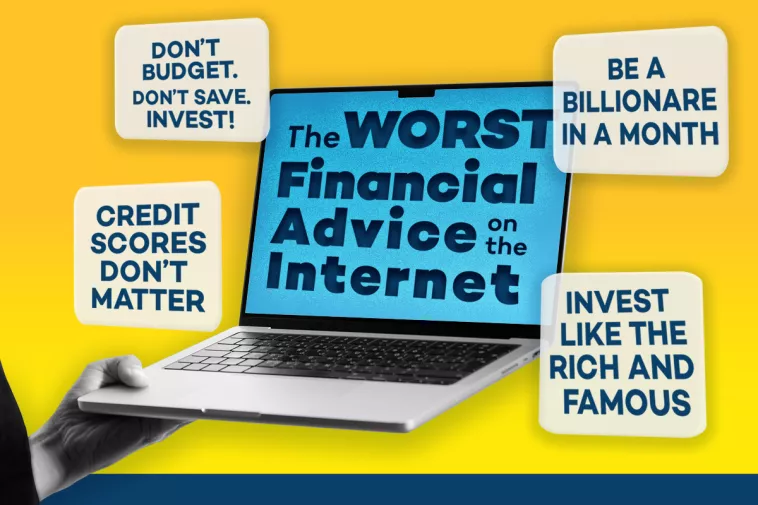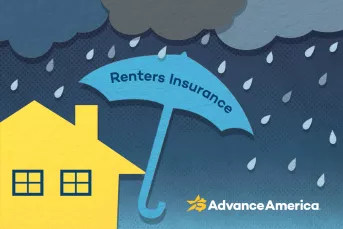
Wallet Wreckers: The Internet's 12 Worst Financial Trends Exposed
Viral money hacks on TikTok, Instagram Reels, and YouTube Shorts may seem like exciting shortcuts to wealth, but many are bad financial advice that can harm your wallet.
Know how to spot the worst financial advice trending online, why it’s risky, and what to do instead so you can protect your money and make smarter financial choices.
1. “Don’t bother budgeting” 🤯
Many finance content creators are pushing back against traditional budgeting. Their main points are:
- Budgets are restrictive: They argue that detailed budgets can make people feel guilty or deprived, like they’re on a “money diet.”
- Tracking in your head is enough: Some suggest you don’t need spreadsheets or apps. Instead, just develop “awareness” of spending habits and loosely keep mental tabs.
- Focus on vibes, not rules: Advice leans toward “spend mindfully” or “just notice where your money goes” rather than rigid categories like 50/30/20.
- Emphasis on lifestyle freedom: They frame budgeting as outdated, saying people should feel empowered to enjoy their money instead of obsessively tracking pennies.
Why it’s harmful: Skipping a budget often leads to overspending, stress, and missed financial goals. A lack of structure makes it easy to lose track of where your money goes.
Better alternative: Use flexible budgeting methods like the 50/30/20 rule, paycheck-based allocations, or budgeting apps. Even small steps, like automating savings and tracking recurring expenses, can give you control over your finances.
2. Credit card lies that can tank your score 💳
Some viral creators give oversimplified or sensational credit card advice that can actually backfire. Common “tips” include:
- Close old cards: They argue it’s “tidier” or helps avoid temptation.
- Max out for rewards: They claim you should put everything on your card to rack up points or cash back.
- Ignore credit altogether: They suggest credit scores are “just a scam” or that cash/debit-only living means you don’t need to care.
Risks: Damaged credit history, high utilization ratios, and increased debt risk.
Better alternative: Keep older accounts open, pay balances in full each month, and maintain low utilization.
➢RELATED: Closing a Credit Card? 3 Things to Know Before it Hurts Your Credit Score
3. “Skip saving, just invest” 🚩
Some finance influencers are pushing the idea that cash savings are pointless. Their main claims:
- Cash loses value: Inflation makes holding savings feel like you’re “losing money.”
- Invest everything: They encourage putting all disposable income into crypto, stocks, or other speculative assets.
- Emergency funds are overrated: They argue you can always sell investments or “figure it out” if something unexpected happens.
Risks: No emergency cushion, potential high volatility, and increased likelihood of debt if unexpected expenses arise.
What to do instead: Build a starter emergency fund, automate regular savings, and invest cautiously. Tools like high-yield savings accounts or low-cost index funds can help you grow wealth safely.
➢RELATED: 9 Money Mistakes (And How to Fix Them)
4. Career hacks that can wreck your paycheck 💼
Some viral creators glamorize risky career and money moves with overly simplistic advice:
- Quit your job to day trade: Framed as a fast path to financial freedom if you “learn the charts.”
- Borrow big to start a business: Promoted as “betting on yourself” regardless of market research or planning.
- Follow your passion and money will follow: Romanticized as the only way to be fulfilled, ignoring financial realities.
Real risk: Unstable income, depleted savings, and increased debt.
Better alternative: Pursue side hustles while maintaining steady employment, build skills, and grow income sustainably.
5. “Invest like a billionaire” 🤑
Some viral content promotes the idea that you can fast-track wealth by mimicking extreme strategies:
- Copy millionaire portfolios: Encouraging people to blindly follow high-net-worth investors or gurus.
- Get rich quick with crypto: Selling the dream that one coin or token will make you a millionaire overnight.
- Chase FIRE (Financial Independence, Retire Early) at all costs: Urging extreme saving and frugality to retire decades early, often ignoring lifestyle balance.
Risks: High losses, lack of diversification, unrealistic expectations.
Better alternative: Start small, diversify investments, use employer plans or index funds, and consult credible financial resources.
6. The dark side of passive income promises 💸
A wave of viral content makes certain side hustles and businesses look like effortless goldmines:
- Drop-shipping: Marketed as “set up a store, sell products you never touch, and get rich in your sleep.”
- Real estate flipping: Framed as a guaranteed way to build wealth quickly with little upfront knowledge.
- Online courses: Promoted as a way to package your knowledge once and watch passive income roll in forever.
Risks: Requires high effort, upfront costs, and can result in debt.
Better alternative: Approach passive income with realistic expectations, start small, and research thoroughly before committing significant resources.
7. “Bank hacks” and illegal shortcuts to avoid ⚠️
Some viral content circulates the idea that you can temporarily access money by:
- Depositing fake checks: Creating or altering checks to appear valid.
- Depositing overdrawn or insufficient funds checks: Withdrawing cash before the bank identifies the issue. While creators frame these as “hacks” to get quick cash or bypass financial limitations, this is bank fraud (a federal crime).
Risks: Illegal, can result in prosecution, account closure, and permanent financial consequences.
Alternative: Stick to legitimate money management strategies, like automated budgeting, small investments, or savings plans, to build security without risking your credit or legal trouble.
8. Opting out of workplace pensions 💰
Some influencers claim you can boost short-term cash flow by:
- Skipping 401(k) or other employer-sponsored retirement contributions: Arguing that the money is “locked up” and not accessible now.
- Focusing on immediate spending or alternative investments: Suggesting you’ll do “better” with cash in hand or riskier assets.
They frame it to prioritize flexibility and lifestyle over long-term planning.
Risk: Loss of employer contributions and reduced retirement savings over time.
Better alternative: Contribute enough to secure employer matching, and adjust discretionary spending rather than sacrificing long-term financial security.
➢RELATED: Financial Planning for Retirement
9. Aggressive debt leverage for “easy wins” 🏦
Some viral content promotes the idea that you can accelerate wealth with bold, entrepreneurial shortcuts like:
- Borrowing large amounts: Getting personal loans, credit lines, or home equity loans they don’t need.
- Investing in high-risk ventures: Crypto, startups, or speculative assets.
- Framing debt as leverage: Suggesting that “smart borrowing” can multiply returns quickly.
Risk: If investments fail, you may lose savings, your home, and long-term financial stability.
Better alternative: Be mindful of your debt, invest money you can afford to lose, and seek diversified, lower-risk options.
10. Money manifestation & “law of attraction” for debt ✨
Some viral content promotes money manifestation and the “law of attraction” as a solution to debt:
- Affirmations alone will erase debt: Creators suggest repeating phrases like “I am debt-free” can magically improve finances.
- Visualization over action: The focus is on mindset, not budgeting, earning, or repayment strategies.
- Spiritual or motivational framing: Often paired with crystals, vision boards, or other manifestation rituals.
Risk: Ignores practical steps, delaying actual repayment and financial planning.
Better alternative: Combine a positive mindset with concrete repayment strategies, like automated payments, debt snowball, or professional guidance.
➢RELATED: How to Get Out of Debt
11. Ignoring risk and regulation 📉
Some financial influencers minimize or overlook important safety measures when giving investment advice:
- Downplaying market risk: Suggesting that losses are unlikely or “don’t worry about volatility.”
- Omitting accreditation: Offering advice without being licensed, certified, or formally trained.
- Ignoring regulatory oversight: Encouraging investments outside of regulated channels, like unregistered securities or high-risk crypto schemes.
Risk: Leads to uneducated decisions and potential legal or financial consequences.
Better alternative: Research advice sources, check credentials, and follow regulated financial guidance.
12. Celebrity-endorsed finance tips 🌟
Some influencers suggest that you can fast-track wealth or financial success by:
- Copying celebrity investments: Buying the same stocks, crypto, or business ventures as millionaires.
- Mimicking lifestyles: Emulating luxury spending, travel, or fashion to “live like the rich.”
- Framing it as a shortcut: Implying that following the wealthy automatically leads to wealth.
Risk: Overleveraging, unrealistic spending, and exposure to high-risk investments.
Better alternative: Focus on personal goals, realistic budgets, and safe, diversified investing.
Where to get money advice you can trust ✅
Take advice from credible sources or financial professionals who disclose risks and limitations, tailoring the advice to realistic, personal circumstances. Following these guidelines can help you separate trustworthy guidance from hype or shortcuts.
Trusted sources:
- Government websites (CFPB, FTC)
- Certified financial planners or advisors (look for CFP, ChFC, CFA, or CP-PFS credentials)
- Nonprofit credit counseling agencies
Red flags: Walk away from overpromises, unqualified sources, and one-size-fits-all tips.
Get-rich-quick hacks rarely lead to smart financial decisions. By identifying bad financial advice, understanding why it’s harmful, and following realistic alternatives, you can protect your wallet and make smarter money choices.
Notice: Information provided in this article is for informational purposes only. Consult your attorney or financial advisor about your financial circumstances.


